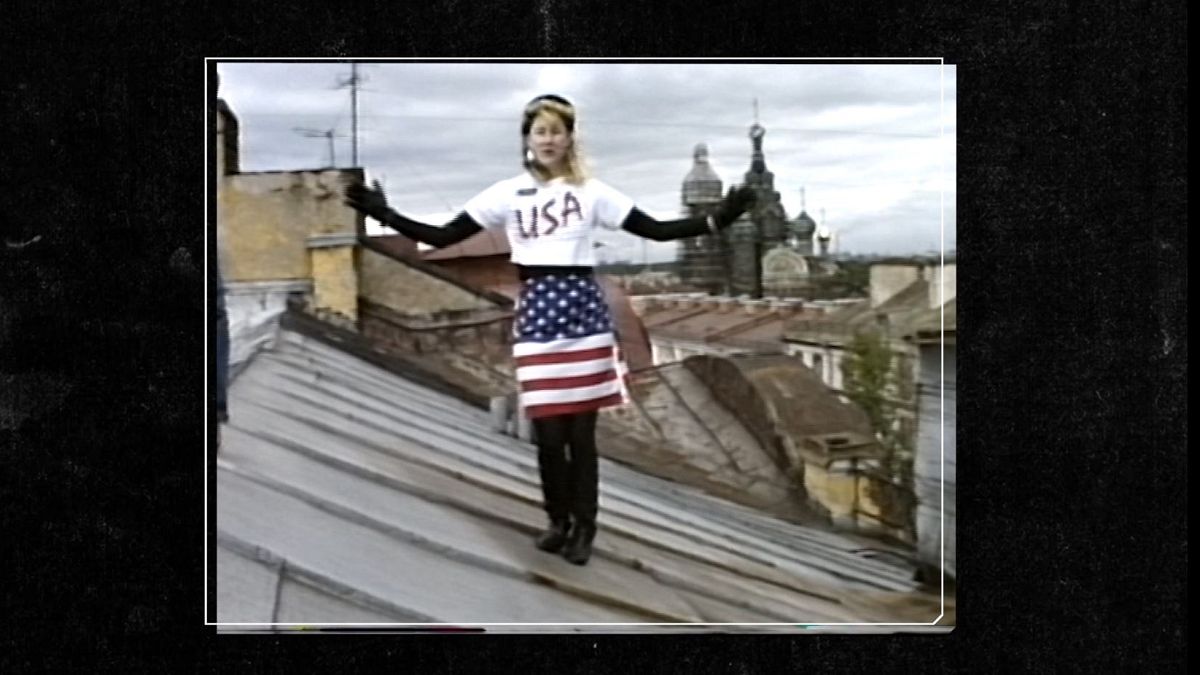This is a story about Joanna Stingray. A girl from California who found herself in 1980s Russia on the radar of the KGB and FBI for smuggling out underground Soviet music that Americans were never supposed to hear.
This is a story about Joanna Stingray. A girl from California who found herself in 1980s Russia on the radar of the KGB and FBI for smuggling out underground Soviet music that Americans were never supposed to hear.
The Kremlin never wanted Russian underground rock to be written or performed — and they definitely didn’t want anybody in the West to be listening to it.
Rock music was a political tool in the Soviet Union, an import from the West that was deemed a threat to the system. So how did underground music go mainstream in a country that lacked freedom of expression?
“So I realised that I had this ability to show the world something they hadn’t seen,” says Joanna, who is now 57 and living in Los Angeles. “We were brought up being so afraid of the evil empire and Russia.”
Joanna Stingray spent most of the '80s in Leningrad with underground rock royalty. With a camera in hand, she filmed their music videos, concerts and even their nights out.
Joanna pulled open the iron curtain with an album called Red Wave.
Red Wave certainly was one of the first glimpses of Russian music around the world, certainly for the States.
In 1983, Joanna was an LA musician who wasn’t getting anywhere at home, so she hopped on a plane to Russia looking for some adventure.
Her understanding of the Soviet Union was not that much different from most Americans. She thought it was cold, grey and miserable.
“And I remember thinking: Oh boy, this’ll be fun, there can’t be any rock in Russia. This is going to be a joke. Wait until they see me,” she says.
To the outsider, there wasn’t real rock and roll in Russia: Everything had to go through the state or had to be approved by sensors and the KGB. But rockers made it happen anyway in cramped communal apartments, in abandoned buildings, on rooftops — there was an underground movement out of sight of the Kremlin and the KGB.
“They didn’t like the way rock looked. I think they didn’t like the way that it riled up the audience. I think they thought like a lot of people did, that rock and roll led to rebellion and led to craziness.”
The Bob Dylan of Russia
But let’s go back to Joanna. It’s now 1984. She’s in Leningrad and about to meet Boris Grebenshchikov. Boris is a cult hero, a poet, a musician without a stage. This guy was the Bob Dylan of Russia who had fans travel the entire span of the USSR – that’s 6,000 miles, twice the distance between LA and New York — just to come and shake his hand. When Boris recorded new music and made 30 tapes, the black market would make a million of them in just a month. This guy was a legend.
“I went there for a week thinking I would go and see this horrible place and never go back, and it turned out to be a place that moved me, and it grabbed me and it got me so jazzed up that I couldn’t think of anything else but getting back into Russia.”
A certain mop-haired guitarist probably had something to do with that: Kino's Yuri Kasparyan. Though he and Joanna didn’t speak the same language, they soon made plans to marry. Young, crazy and in love. But before that happy day, Joanna had work to do.
Over the next two years she skirted back and forth between LA and the USSR carrying donated guitars and keyboards with her, and on every plane ride back she left with recordings, lyrics and music videos of Leningrad’s top underground rock bands. She stuck all of this cultural contraband into the soles of her shoes and linings of her coats. Red Wave would soon become a hit in the US.
It seemed like Joanna was helping to build a cultural bridge between the US and Russia. Young Americans watched the Red Wave music videos and thought ‘hey, these guys look like rockers here’.
The banned bride
Joanna set a wedding date and bought a dress, but then, of course, this happened.
“A Telex came back from Moscow that said ‘Moscow is not expecting Joanna Stingray’.
“It was a message sent from them that was ‘here’s your payback for making that record’.”
Joanna was labelled by the Soviet Union as an enemy of the state. She couldn’t go back to marry Uri and the following months were agonising. Her star had risen but she was punished for it. She took her case to the national press.
“No isn’t a word that’s in our vocabulary in terms of this problem,” she says on an unnamed TV show, “we know it could be difficult, it could take a lot of time but it’s gonna happen, somehow we’ll make it happen.”
And sure enough it did happen. Joanna is not entirely sure how, but she thinks her enemy status was revoked as an act of goodwill between America and Russia. Gorbachov was supposedly a fan of rock music and a copy of Red Wave’s album made its way to his desk.
So she returned to Leningrad and Joanna and Yuri had their rock-and-roll, fairytale Russian wedding.
Things changed quickly after that. It was the time of perestroika and glasnost: change and openness. Indie record labels began popping up in Russia. Leningrad’s rockers went from risking arrest to playing sold out shows all over the country.
They used music to help crack open the USSR to the rest of the world, and ultimately, that made the cold war just a little bit warmer.
